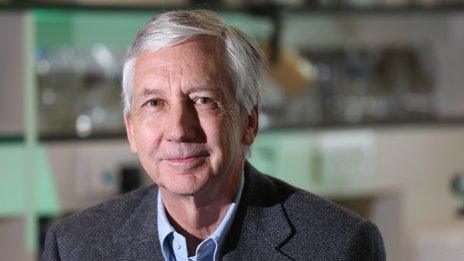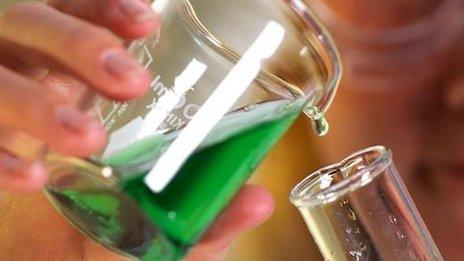Prof Yves Barde: Cardiff University lands 'star' stem cell researcher
- Published

Prof Yves Barde will further his research into the use of embryonic stem cells
A £50m project to attract world-class scientists and their teams to Wales has made its first appointment.
Prof Yves Barde, from Switzerland, is renowned for his research into the way proteins in the brain work and their role in illnesses such as depression.
Prof Barde, currently at the University of Basel, will take up his post at Cardiff University in September.
It said science was an international business and "we're importing one of the most important stars."
He was appointed under the Welsh government's five-year Ser Cymru (Stars of Wales) project to expand universities' research capabilities in the fields of life sciences, advanced engineering, and low carbon energy and the environment.
Prof Barde received international acclaim in 1989 with the discovery of a gene which creates a protein - brain derived neurotrophic factor (BDNF) - which is involved in number of brain processes including memory.
He has explored the the role of BDNF plays in healthy brain function along with dysfunction.
Recently his team at the University of Basel focused on how some drugs can increase BDNF levels in specific areas of the brain.
The research helped in the development of new drugs, including the first oral treatment of multiple sclerosis.
Prof Barde says he hopes to develop his current research interests of using stem cells to understand how the brain works and also to explore mental health illnesses such as depression.

Embryonic stem cells were first identified by Cardiff University Nobel Prize winner Prof Sir Martin Evans
He said: "Some of the work I'll be undertaking in Cardiff will be about understanding the meaning of the link between the nervous system and neurological diseases which currently remains pretty mysterious, particularly in the case of depression.
"But alongside several outstanding research groups at Cardiff University, I will also aim to advance research using embryonic stem cells and reprogrammed somatic cells to advance understanding of neuronal dysfunction.
"This is a really exciting time for me, and for advances in neurobiology and for science in Wales."
Cardiff University is already widely recognised for research into stem cells.
The university's chancellor and Nobel Prize winner, Sir Martin Evans, was the first scientist to identify embryonic stem cells.
Prof Yves Barde's appointment is part of the Welsh government's five-year Stars of Wales (Ser Cymru) project
These are cells which are taken from an embryo and which can develop into many other types of cells that can then be adapted for a wide variety of medical purposes.
There is some opposition to this research on moral or ethical grounds although the research has proved to be highly valuable in understanding many diseases.
Cardiff University vice-chancellor Prof Colin Riordan believes the appointment will build on the university's strengths.
"It is a testament to the university's existing strengths in neuroscience and stem cell research that we are able to attract a scientist of Prof Barde's calibre.
"By working with others in his field, Prof Barde will be able to help Cardiff University tackle some of the biggest health challenges of our time."
Prof Ole Petersen, director of the university's school of biosciences, told BBC Wales: "I'm delighted about this great prospect of fostering world-beating research.
'Dynamic'
"Science is an international business. We see throughout Europe that countries with the most internationalised science do the best science.

Science research is vital for a prosperous Wales, says Economy and Science Minister Edwina Hart
"And we're importing one of the most important stars."
Economy and Science Minister Edwina Hart said: "A strong science research capability is vital to improving our economic well-being and securing a prosperous, healthy and sustainable future for Wales.
"We already have a lot to be proud of in science and innovation in Wales but the Ser Cymru programme will help us build on that to develop a dynamic and strong base in Wales."
- Published12 March 2012

- Published25 November 2014